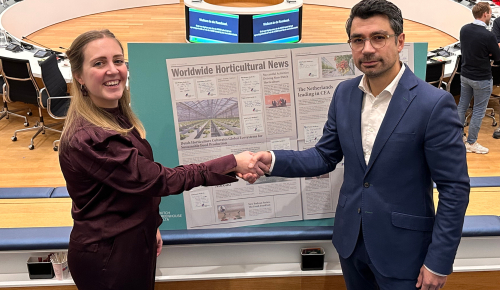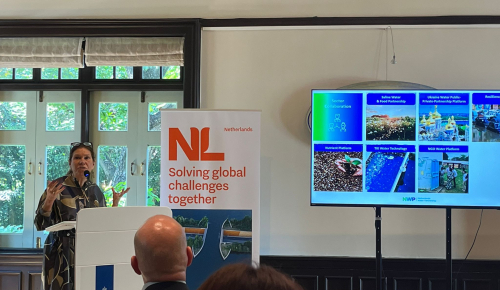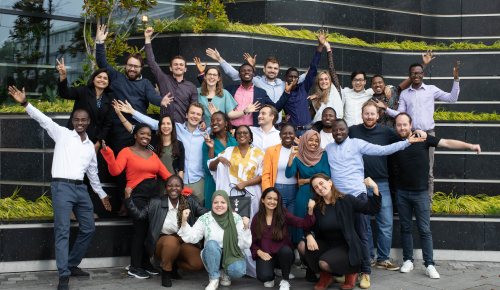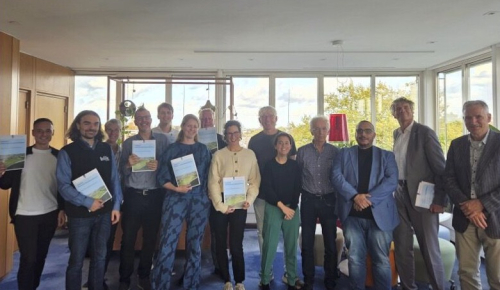Corporate news
11 September 2025Water, food and climate resilience: NWP’s contributions to Stockholm World Water Week 2025
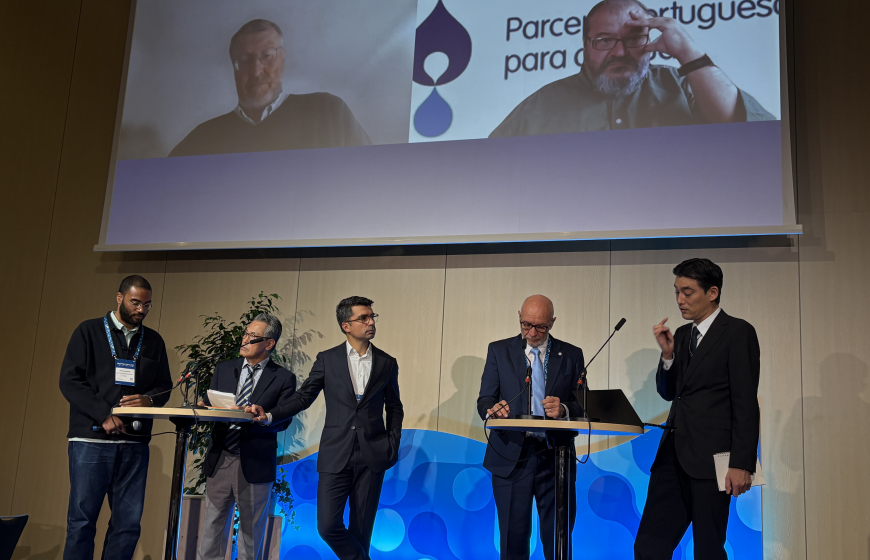


At Stockholm World Water Week 2025, the Dutch water sector stood out through its active presence of public and private organisations, government representatives, and knowledge institutes hosting and contributing to many sessions. NWP held two inspiring sessions highlighting the links between water, food and biodiversity, and between water and climate resilience, and contributed to many more. The recaps below share the key messages, lessons learned, and proposed action points from both sessions.
Stockholm World Water Week (SWWW) took place from 24-28 August and engaged more than 13,000 people from 188 countries and territories who joined the event in person or online. Of all of the attendees, 38 percent were below 35 years, and there was a balanced ratio of women and men.
Through numerous dynamic discussions, sharing information on innovations, knowledge exchange, networking, panel debates, and presentations, the Dutch participants advanced this year’s overarching ‘Water for Climate Action’ SWWW theme. With a proven track record in nature-inclusive, innovative, and integrated approaches, the Netherlands was positioned as a trusted and highly relevant partner in tackling global climate challenges. This collective effort highlighted the Dutch water sector’s role as a connector between global challenges and local solutions. It inspired collaboration and innovation well beyond national borders.
NWP’s contribution
During the week, NWP organised two high-level sessions on the water-food-biodiversity nexus and on accelerating climate action through cross-sector partnerships. In addition, NWP Director Rick Elmendorp joined the Asian Development Bank’s Roundtable on Accelerating Inclusion in Water. He highlighted the impact of the Young Expert Programmes (YEP) as an inspiring example of youth empowerment. These sessions and contributions resulted in valuable lessons and practical solutions – a solid starting point for continued dialogue and action.
Recap: water-food-biodiversity for sustainable development in a changing climate
NWP, Wageningen University & Research, and the Netherlands Food Partnership convened a high-level session to explore the vital connections between water, food systems, biodiversity, and climate resilience. With agriculture consuming around 70 percent of global freshwater, and climate change intensifying the hydrological cycle, the urgency for integrated action was clear.
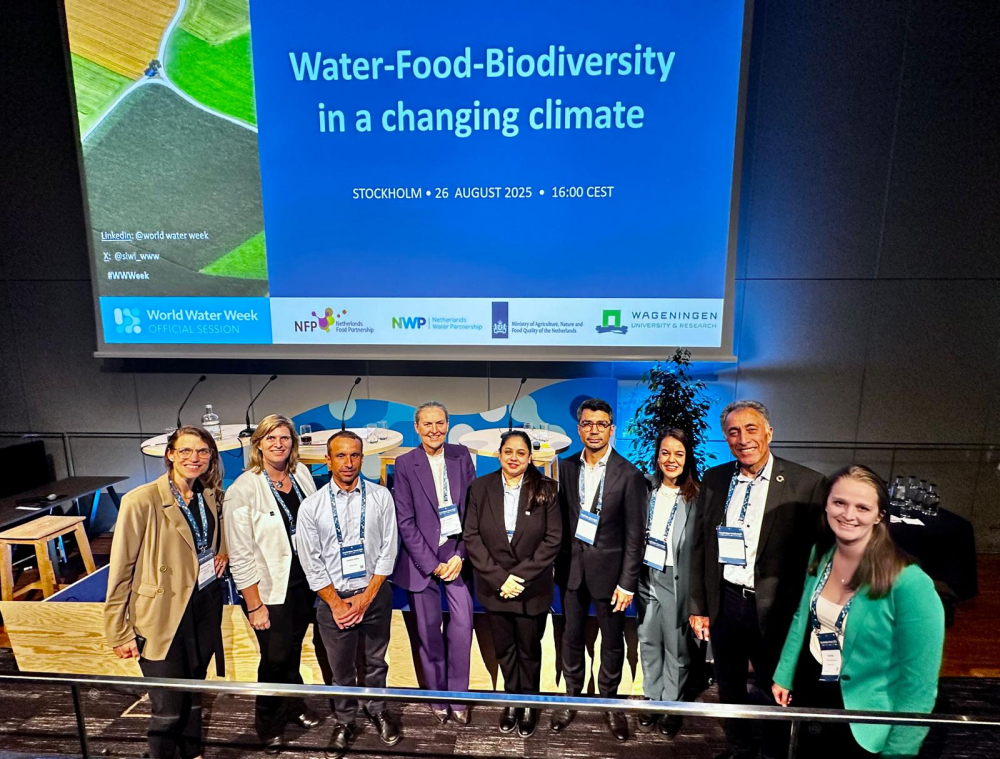
Blue, green and atmospheric water
Professor Petra Hellegers (WUR) opened the session by reframing the debate around green water (soil moisture) and atmospheric water, which are often overlooked compared to blue water. “There is a clear need for more attention for green and atmospheric water governance,” she emphasised, pointing to blind spots in current frameworks and urging multi-stakeholder dialogue and institutional redesign.
Henk Ovink (Global Commission on the Economics of Water) continued the discussion on this perspective, stressing the need to consider the entire hydrological cycle, not just blue water. He reminded the audience that more than 50 percent of rainfall originates from transpiration, making land use change and biodiversity loss critical drivers of water security. “Water, climate, and biodiversity are fundamentally linked. We must deal with them holistically.”
The value of monitoring and data
From the private sector, Jonathan Sottas (Nestlé) presented a risk-based approach to water in global supply chains. Using climate projections up to 2040, Nestlé identifies hotspots and invests in regenerative agriculture to strengthen resilience. Yet, he noted persistent challenges in “data traceability, metrics standardisation, and financing nature-based solutions.”
Meghna Mukerjee (MetaMeta) showcased the Harvesting Water, Harvesting Hope project in India. Interventions such as planting hedgerows, alternate wetting and drying, and ecological rodent management aim to reduce crop losses and restore soils. She stressed that monitoring is an active part of their project, providing the evidence base needed to influence policy and scale solutions.
Rasoul Mikkelsen (Royal Eijkelkamp) shared a Sri Lankan initiative where real-time groundwater monitoring combined with AI predictive analytics helps build resilience. “By feeding this data into AI, we can predict what will happen with aquifers and strengthen future water security.”
Insights and action points
In the panel, Tara Klijn (Amref), Berry van den Pol (Practica), and Tanya Huizer (Asian Development Bank) underlined the importance of community ownership, simple yet scalable innovations, and integrated data systems.
Closing the session, Ovink reminded participants that “If we want to deliver on our water and climate agendas, we have to value water and govern it accordingly”. This call to action was echoed in the session’s main takeaways: broaden governance to green and atmospheric water; invest in data and monitoring; and, ensure community ownership to make solutions truly scalable.
Recap: accelerating climate action through cross-sector partnerships
NWP convened a session with the NoWNET partners from Denmark, France, Japan, Korea, and Portugal. It centred on the newly launched EU Water Resilience Strategy and how early alignment with this framework can drive climate action through cross-border and cross-sector cooperation.
Three objectives
Keynote speaker Andrea Rubini from Water Europe outlined the EU strategy’s three core objectives: restoring the water cycle; building a water-smart economy and society; and, securing clean and affordable water for all. “No water doesn’t only mean no food. It also means no peace and no sustainability. Without water, we can do nothing,” Rubini warned.
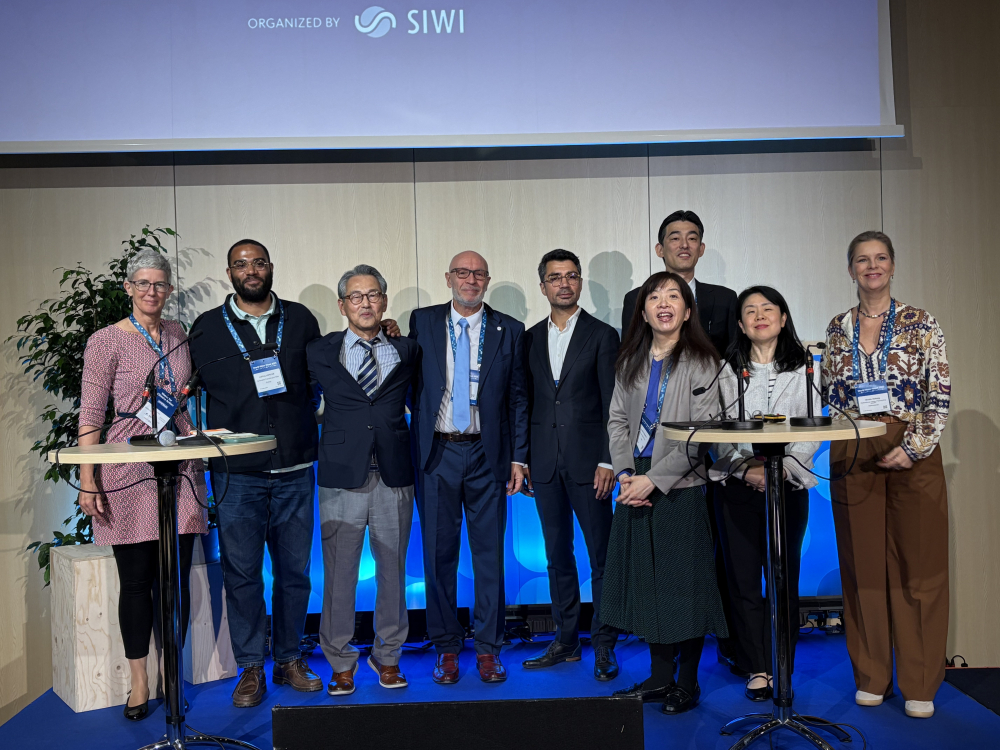
Perspective from Asia
Contributions from Japan and Korea shared similar perspectives. Shin Nemoto (Ministry of Land, Infrastructure, Transport and Tourism) described Japan’s integrated river basin management across 109 major rivers. He stressed that all stakeholders, from farmers to basin administrators, collaborate to promote comprehensive multi-purpose measures across the entire river basin.
Eun Namkung (Korea Water Forum) highlighted South Korea’s unification of water quantity and quality management under a single ministry. “Before that, we were operating in silos. Now, there is a strong unified vision and legal framework covering water and climate adaptation.” This reform has helped achieve 99 percent drinking water coverage and 96 percent sewage treatment nationwide.
A unified strategy
The panel discussion brought together perspectives from the Netherlands, Portugal, and Denmark. Rick Elmendorp (NWP) argued that the EU Water Resilience Strategy not only creates opportunities to connect water to climate adaptation, spatial planning, and nature-based solutions, it also brings “possibilities to learn from each other”. João Simão Pires (Portuguese Water Partnership) welcomed the Strategy as a unifying framework but raised questions about how competitiveness and new markets, such as nature credits, will be addressed. Jesper Goodley Dannisøe (Danish Water Forum) emphasised pragmatism and utilising low-hanging fruit. “There is no need to reinvent solutions. There are already many tools on the shelf that we can start using immediately.”
Viable business cases
Throughout the session, financing emerged as a recurring theme. One participant from the European Investment Bank pointed to the gap between available finance and eligible projects. Elmendorp responded, saying “There are always enough projects and enough money, but the two can’t find each other. To shape viable business cases, investors must be involved at an early stage.”
The session concluded in a consensus: early alignment, integrated financing, and, above all, collaboration are essential to translate the EU Water Resilience Strategy into action.
Time for action
A strong spirit of collaboration defined Stockholm World Water Week 2025, breaking down silos and fostering cross-sector and cross-boundary cooperation. The sense of urgency that echoed throughout the event led to valuable insights and clear action points. As Elmendorp reflected, “Now it is time to translate these dialogues into action and impact.”
Featured NWP members: Wageningen University, Alterra, Royal Eijkelkamp, AMREF Health Africa, Practica Foundation
Featured NWP partners: Netherlands Food Partnership
